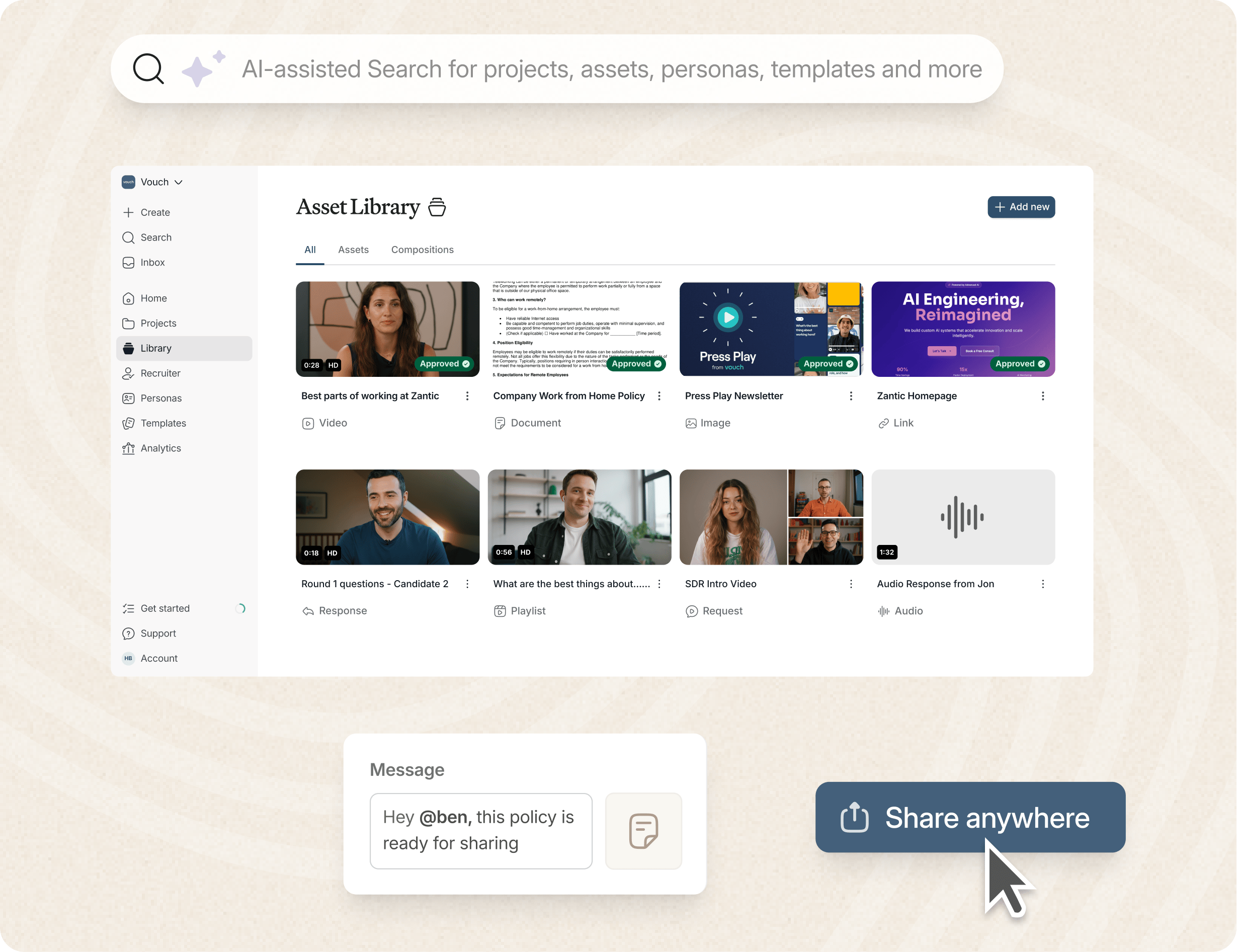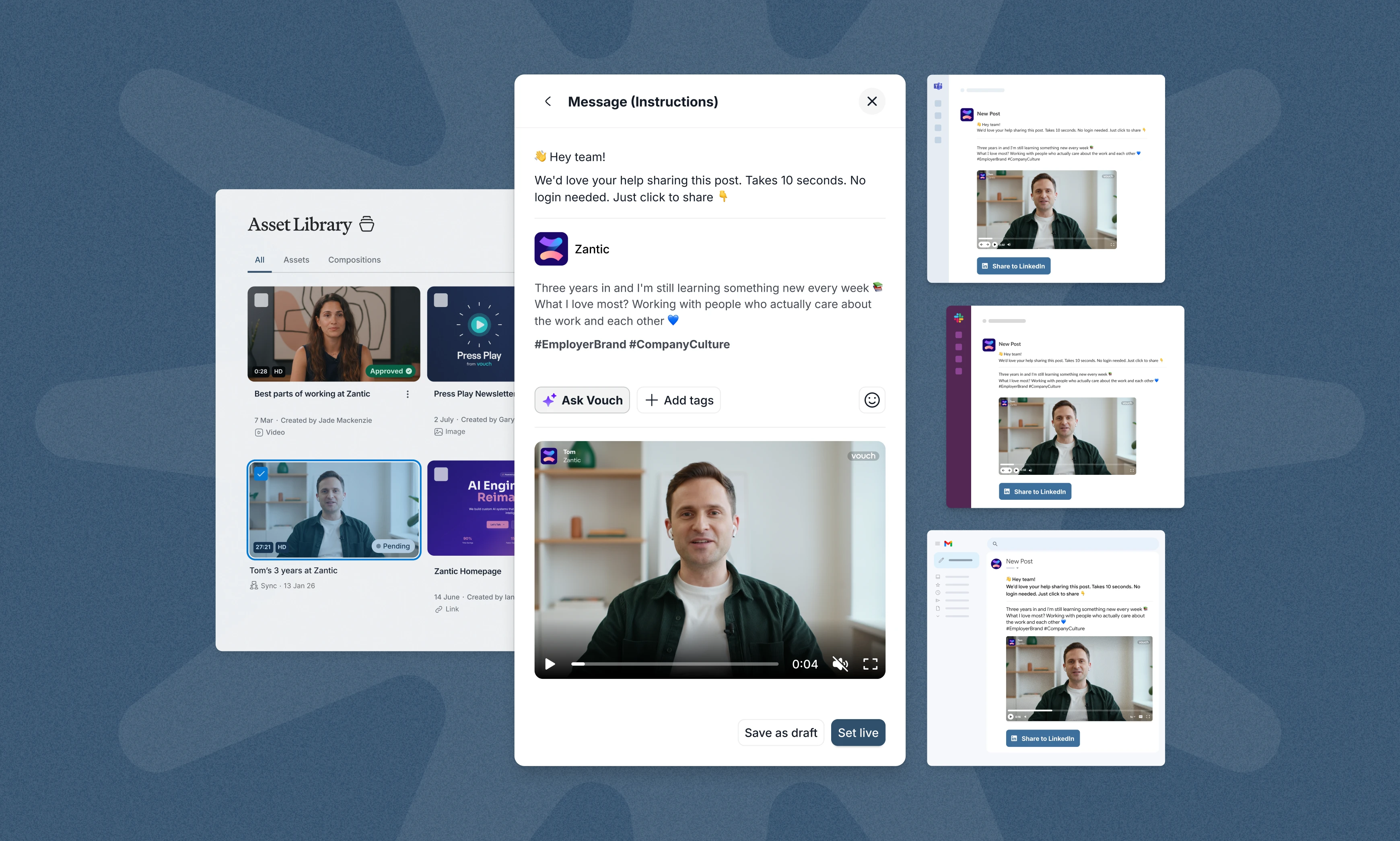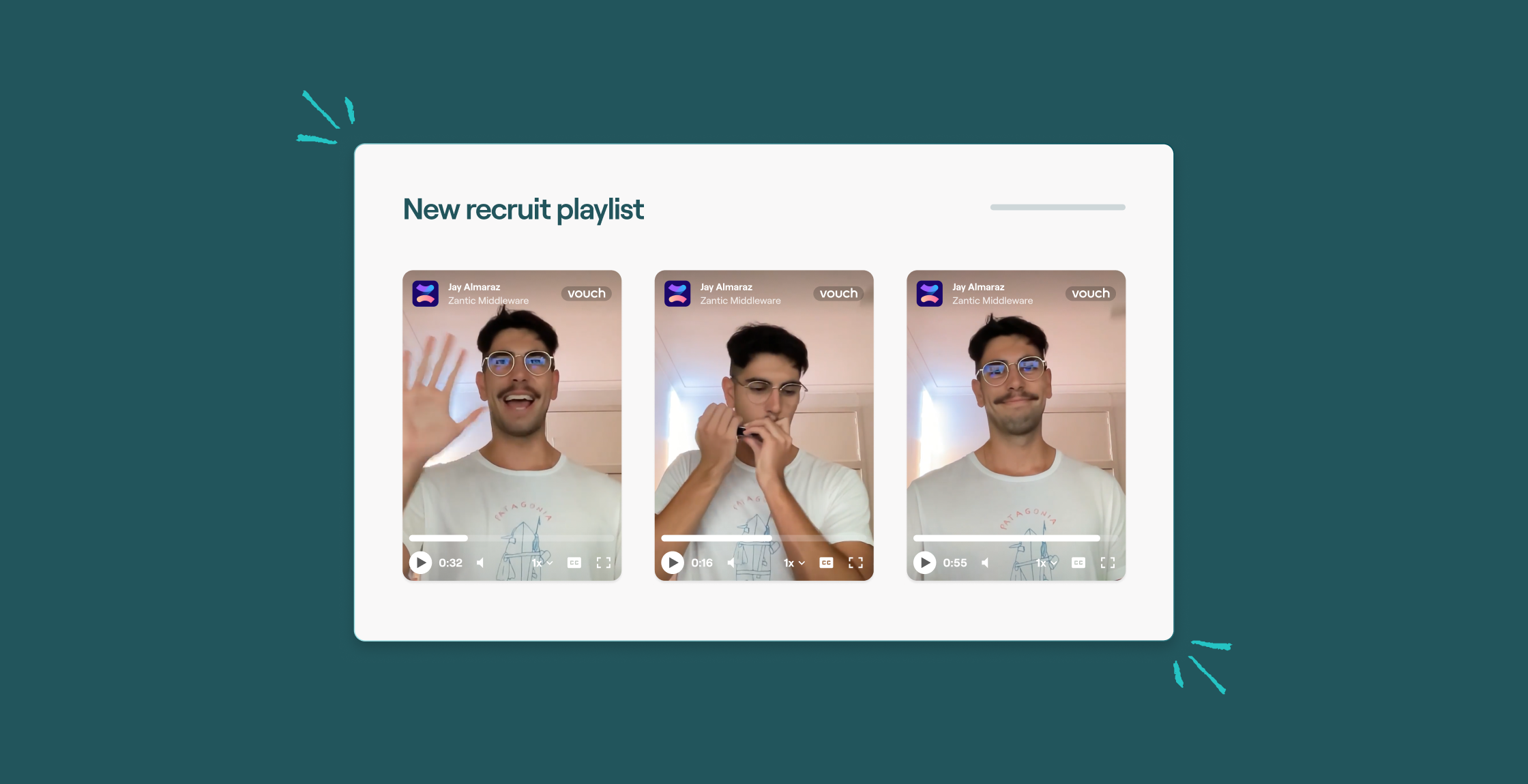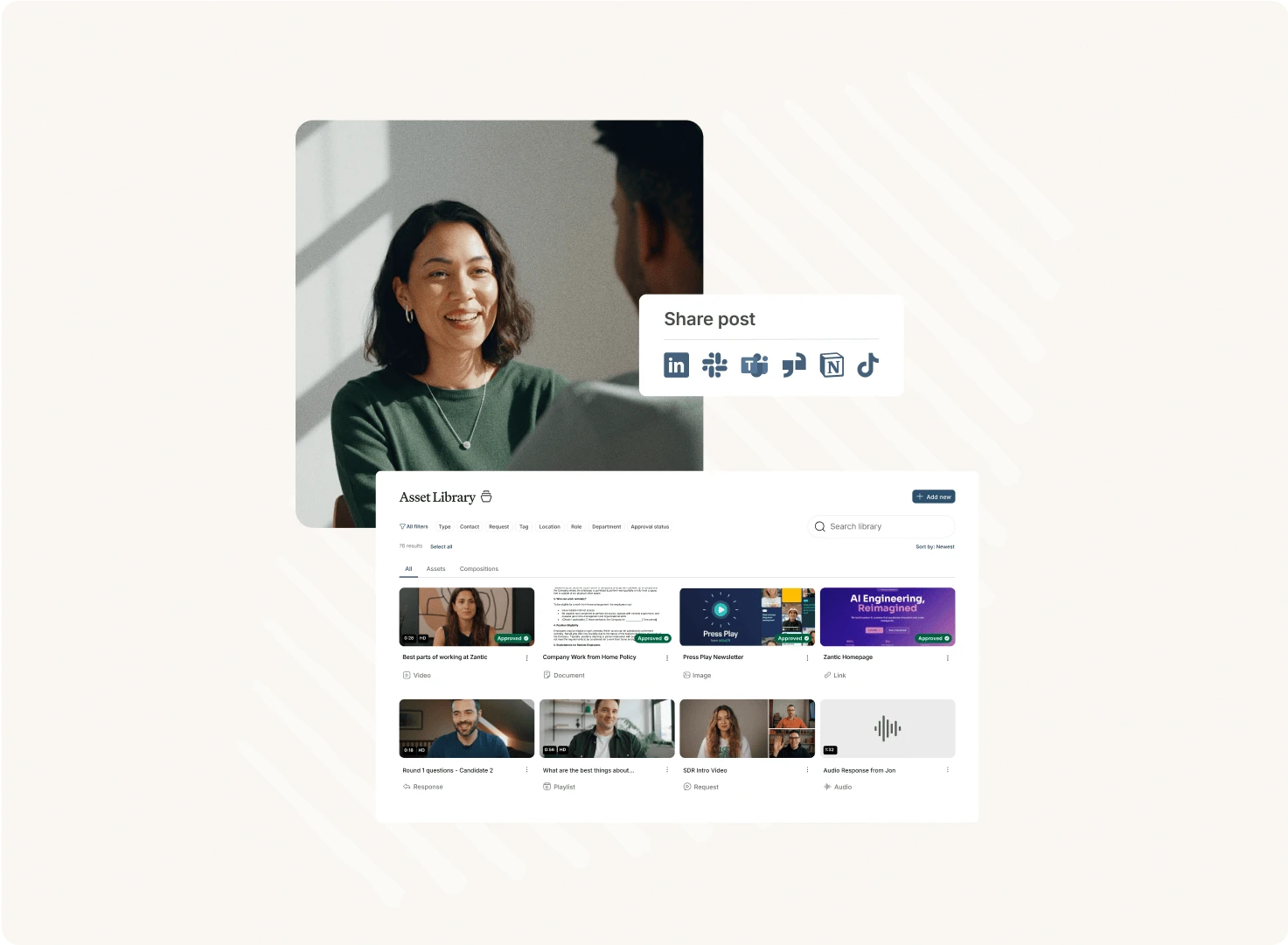In today's hyper-competitive online job market, recruitment marketing is vital for attracting, and retaining the best very talent.
Whether you're looking for an active or passive job seeker who might just "be open to a job change", recruitment marketing is all about making your company look more attractive than your competitors - so top talent chooses to work with you.
In this article, we dive into how to attract the world's best talent through the latest recruitment marketing strategies.
So let's get started
What Is Recruitment Marketing?
Recruitment marketing uses traditional - and more modern marketing strategies like video content to attract, engage, and nurture potential candidates for your open roles.
The goal of recruitment marketing is simple: To attract the perfect people for your company's culture, mission, and positions.
Recruitment marketing leverages your employer brand while going deeper into the specific roles you have open.
For example, your recruitment marketing videos should cover:
- The role at hand: The goal is to help candidates fall in love with your company's challenges, team, and atmosphere.
- Career advancements: The potential for growth and development within your company matters. Discuss the pathways you have.
- Compensation and benefits: You might want to avoid going into details, but mention the competitive nature of the company's pay and benefits.
- Recruitment and onboarding processes: Walk potential candidates through the following steps, so they apply without hesitation.
For simplicity, your recruitment marketing videos could be an individual video for an open role - or they could focus on a particular team, like software engineering or accounting, that can be easily shared on social media and online networks.
If you are looking to produce video content for your recruitment marketing, be sure to check out the Vouch product tour here.
What Is Your Employer Brand?
When discussing recruitment marketing, we must also discuss your employer brand.
A strong employer brand almost always leads to higher-quality applicants for your roles, superior employee engagement and often reduced turnover.
For your employer brand content, you should include the following:
- Company culture: The work environment and capturing "the feeling" of working at your organization.
- Work-life balance: A lot has changed since covid. Talk about employee well-being and work-life balance.
- Employee testimonials: Real stories and experiences shared by current or former employees, especially powerful with Video.
- Diversity and inclusion: The company's commitment to a diverse and inclusive workplace.
- Your leadership team: It's vital that your leaders are there to guide and support your employees. Show how you do it.
Please just note that your company branding is different, and your company brand could be one "overarching video" used in your wider PR, marketing, social media, capital raises, etc.
Your recruitment marketing would be "several videos" to help attract the best talent, secure them over your competitors, and provide a better candidate journey for potential employees. There's a real difference between your employer and company brand. Just contact us if you need to chat to a video content expert.
The AI-enabled workspace for talent teams.
- Unified workspace for talent teams
- Accelerate hiring with AI tools
- Auto-generate polished hiring and employer brand content
- Easily repurpose assets across all channel

What Are The Benefits of Recruitment Marketing?
We know that the world's most successful companies have the world's best talent working on their teams.
Anyone with Google on their resume can generally beat out all other applicants simply because we all know Google hires the best talent.
Google is a market leader at recruitment marketing, and to put this in perspective, consider that reports indicate that Google gets over 3,000,000 applications a year, yet hires just 20,000 people annually. As you can see, Google gets to pick their hires.
The same applies to Microsoft, Apple, and even smaller companies like Vouch, because we put our employer brand out there, and this is core to recruitment marketing.
So while we mention unicorn companies, recruitment marketing might not be as difficult as you think. Tools like Vouch are ideal for helping all kinds of companies compete for the very best talent.
Here are some of the top benefits of recruitment marketing:
1. Attracts the top active and passive candidates
Recruitment marketing helps you reach a wider audience of candidates, including those not actively job searching (a huge benefit). Using social media platforms like Twitter, Linkedin, Facebook, and Instagram, you can attract the best talent, even candidates who may not be actively looking for a new employer.
2. Enhances your candidate experience
Recruitment marketing helps create a better candidate experience, which matters when looking for the best person for a role. Ultimately, you are giving precious and transparent insights into your company, which provides candidates with a great understanding of your company.
4. Grows your employer brand
The more your company is seen on social media and other channels, the more your employer brand organically grows.
By consistently showcasing what makes your company and roles unique, more top talent, potential customers, and even people like investors will remember you.
Incorporating these recruitment marketing channels into your hiring manager strategy can attract top talent, improve employer branding, and ultimately enhance your company's overall hiring process.
Should You Start Recruitment Marketing in 2026?
Absolutely if you are not already, it can be a game changer for companies of all shapes and sizes!
Successful companies invest in recruitment marketing because it works remarkably well, and they start it before they even have an open role.
Remember, recruitment marketing isn't just about attracting candidates; it's about attracting "the right" candidates, and it's never too early for that!
Recruitment Marketing Guide: The 7 Steps for Success
As we get into the nuts and bolts of recruitment marketing, we need to understand that recruitment marketing is much easier if your "Employer Brand" is on point.
Here are the core steps to follow to implement recruitment marketing into your recruitment process:
1. Review your employer brand
Have you created any employer brand video(s) already, ideally with your current employees? If not, we suggest you create one first. Here's how: https://vouchfor.com/employer-brand-videos. If your Video needs to be updated, we'd suggest creating a new ones asap.
2. Check if you can post on social media (if not already doing so)
Social media platforms like LinkedIn and Twitter are essential for recruitment marketing. This is how you reach a wider audience of candidates and share your company's job opportunities. The first step is getting the go-ahead to post videos on your social channels.
3. Simplify your job descriptions
Ensure your job descriptions are remarkable before creating a video for an open position. If in doubt, do some research - this matters as your recruitment videos will lead to a job description, so you don't want to lose them there.
4. Create engaging video content
Once you have clear and engaging job descriptions, it's time to make a video about the role that showcases your team's culture, projects, and talent. To fast-track this, we suggest booking a free demo of Vouch, and we can show you how to produce the right videos for your company.
5. Utilize targeted advertising
Posting organically on social is a significant first step. However, you may also want to put some budget behind this to raise more awareness, such as by boosting the post. Targeted advertising allows you to reach the people who best fit your company, skillsets, and the role you need to fulfill.
6. Engage with candidates
Recruitment marketing is about attracting - and engaging with candidates. Quickly respond to comments and messages on social media and always provide personalized communication. This is not a job for a bot! You need to leave a lasting impression on all candidates.
7. Start measuring your results
Like any marketing strategy, measuring the success of your recruitment marketing efforts is essential. Use analytics tools to track website traffic, social media engagement, and job application rates. This will allow you to adjust and continue improving your recruitment marketing strategy.
Understanding the "finer details" of recruitment marketing
An effective recruitment marketing strategy is often an omnichannel strategy that needs your company to work together to get in front of prospective candidates, build relationships, and generate candidate engagement and applications.
Let's look at some finer recruitment marketing details, where your marketing team may be able to help if they aren't already:
- Employer Reviews: One thing you need to consider is your reviews. Glassdoor changed the game. Seek, Indeed, and others followed suit with employer reviews. If you have any negative reviews, you need to address them openly. At this stage, it might be worth redoing your employer brand video. Just contact us if you need help figuring out where to start.
- Candidate Personas: Identifying target candidate personas is essential for effective recruitment marketing. By understanding your desired candidates' characteristics, preferences, and behaviors, you can tailor your marketing efforts to attract the right people.
- Employer Value Proposition (EVP): ,Your employer brand video may or may not cover this, but your EVP outlines what your company offers to its employees regarding culture, benefits, and career opportunities. You want to show candidates that they have a place to learn, grow, and flourish.
What Are Some Of The Best Recruitment Marketing Examples?
Recruitment marketing is increasingly important in today's competitive job market, where location is often not a barrier to finding the right talent.
Companies (like those below) constantly seek new and innovative ways to attract top talent and stand out. Below are examples of recruitment marketing and different recruitment strategies from some of the world's most famous companies:
Google is known for its unique company culture and career growth opportunities, and it does an excellent job of showcasing this through its various recruitment channels and marketing efforts. Its "Life at Google" YouTube series gives potential candidates an inside look into the company's culture, perks, and projects. Google also uses targeted advertising on social media to reach individuals with specific skills or experience.
HubSpot
HubSpot attracts top talent through a combination of creative content and strong employer branding. Their careers page is filled with engaging employee testimonials, videos showcasing their culture and values, and a clear EVP highlighting what they offer to employees. They also have an active presence on social media, like their YouTube HubSpot life, and use targeted advertising to reach potential candidates.
Salesforce
Salesforce strongly emphasizes diversity and inclusion in its recruitment marketing efforts. Its "Trailblazing Together Groups" highlight its employees' diverse backgrounds and experiences, showcasing its commitment to creating an open and inclusive workplace. Salesforce also uses targeted advertising on its social media channels to reach various candidates.
Accenture
Accenture's recruitment marketing strategy centers around building a personalized candidate experience. The company has a strong social media presence and regularly engages with potential candidates through events, webinars, and personalized communication. It also utilizes targeted advertising to reach candidates with specific skills or experience.
Netflix
Netflix is known for its unique and creative content, which it incorporates into its recruitment marketing strategy. Their "We Are Netflix" blog features stories from employees across different departments and locations, giving potential candidates a glimpse into the company's culture and values. They also use targeted advertising to complement recruiters and reach individuals with specific skills or experience.
These are just some examples of how top companies have effectively utilized recruitment marketing activities to attract and engage top talent from the candidate pool—now and for future employees who may be in the market later. These examples also show how well these companies understand their target audience, whether potential employees on a job search or their customers.
What Role Does Social Media Plays in Recruitment Marketing?
In 2026, social media is a part of our daily lives, without even thinking about it.
Social media also significantly impacts how companies approach their recruitment, hiring processes, and inbound marketing.
Social media recruiting works perfectly on platforms like LinkedIn and Twitter, which offer a unique opportunity to reach a broad audience. You can also get shared by your current employees and those who love your culture and job opportunities. Social media is vital for the top of your recruitment funnel.
Let's look at social media's role in recruitment and talent marketing.
1. Social media helps you reach a wider audience
With billions of active users on platforms like Facebook, LinkedIn, Twitter, and Instagram, companies can expand their reach beyond traditional job websites. The caveat is that the content needs to be amazing to work on social media. That's where recruitment marketing techniques such as Vouch video help.
2. Helps you showcase your company culture every time you have an open position
Your open positions are social media gold regarding your candidate funnel and brand! Through recruitment marketing videos, you can give potential candidates an inside look into your company and workplace, and so can potential customers. It's like having your cake and eating it, too - you can exceed candidate expectations before they even apply for the role while building your brand and reputation.
3. Provides seamless, real-time engagement with candidates
The problem with email is that a candidate fires off a resume and then sits and waits for a reply while other companies (all your competitors regarding recruitment) engage with your applicant pool. Real-time chat makes applicants feel comfortable as they know "who" they're talking to - and it's not disconnected.
Social media lets you connect instantly with potential applicants and follow up with non-invasive check-ins. Experienced employees will love this as they are likely in high demand and need more time with the traditional candidate funnel, especially if they have their own network.
4. Social Media can provide amazingly focused targeting
Social media platforms also offer advanced targeted options to reach specific demographics or individuals with particular skills or experience. Using targeted social media advertising, you can ensure that your recruitment efforts focus on reaching the right audience and returning the best ROI from your marketing budget.
FAQs
What is a recruitment marketing "funnel"?
The recruitment marketing funnel is a framework that outlines the stages job applicants and candidates go through when being attracted to, engaged with, and ultimately hired by your company - your conversion rate. Recruitment marketing includes four main stages: awareness, interest, consideration, and application.
Understanding this funnel allows you to tailor your recruitment marketing efforts to attract and engage the best candidates, including testing employee referral programs. A recruitment funnel is much like a digital marketing funnel.
What are the best practices for creating engaging job advertisements in recruitment marketing?
To create engaging job advertisements in recruitment marketing, focus on highlighting the company culture, benefits, and opportunities for growth. Use language that resonates with your target audience, showcase specific job perks, and include a clear call-to-action to encourage potential candidates to apply.
Additionally, consider incorporating testimonials from current employees to provide social proof and credibility. Utilize visual elements such as videos or infographics to make your job postings more eye-catching and memorable. Regularly review and update your recruitment marketing strategies to stay ahead of the competition.
What are the differences between recruitment and recruitment marketing?
Recruitment refers to identifying and hiring qualified candidates for open positions within an organization. It involves activities such as job posting, candidate sourcing, and conducting interviews. On the other hand, recruitment marketing is a strategic approach to attracting and engaging potential candidates by showcasing the company's employer brand, culture, and opportunities through Video and various channels like social media marketing.
Recruitment marketing aims to build a strong talent pool and pipeline to support the company's recruitment marketing goals. It is an essential part of the overall recruitment process in today's market.
What are the goals of recruitment marketing?
The main goal of recruitment marketing is to attract and engage top talent for your company. This leading talent network includes active job seekers who are actively looking for new opportunities and passive candidates who may not be actively seeking a job but could be interested in working at your company.
Other specific recruitment marketing goals include increasing brand awareness and employer branding, building a strong talent pipeline for future hiring needs, developing the employee value proposition, and reducing the time-to-hire and cost-per-hire for open positions. Ultimately, recruitment marketing aims to support the overall recruitment efforts by attracting and engaging the best candidates.
What are the key strategies for effective recruitment marketing?
To master recruitment marketing, blend creativity with strategic planning. Start by defining your employer brand to highlight your unique culture and values. Use social media platforms like LinkedIn and Instagram to showcase your company culture and job openings through engaging content. Write compelling job descriptions and optimize your careers page for a user-friendly experience. Regularly publish content that demonstrates your industry expertise and boosts SEO.
Encourage employees to share job openings on social media to enhance your reach. Use data analytics to track and refine your efforts. These strategies will help you attract top talent and strengthen your employer brand through effective storytelling.
How can you measure the success of your recruitment marketing efforts?
Measuring the success of your recruitment marketing involves tracking key metrics like the number of applicants, time-to-fill, and cost-per-hire. You can assess the quality of hires through their performance and retention rates. Use analytics tools to track applicant sources and analyze engagement metrics on your content. Gather feedback from new hires to understand their candidate experience. You can consistently analyze these metrics to refine your strategies and improve your recruitment marketing efforts.
Why is employer branding important in recruitment marketing?
Employer branding is crucial because it shapes how potential candidates perceive your company. A strong employer brand attracts top talent, reduces hiring costs, and improves employee retention by showcasing your company's culture, values, and benefits, making your organization desirable. Building a positive employer brand also helps to differentiate your company from competitors, creating a unique and attractive identity in the market.
Moreover, a strong employer brand can increase employee engagement and productivity, as employees are more likely to be proud of where they work and feel connected to the company's mission and values. Ultimately, investing in employer branding can significantly impact your organization's success and growth.
Conclusion
The potential of recruitment marketing is enormous and is being harnessed by the world's very best companies, such as Google, HubSpot, and millions more, who you're competing against for top talent.
Recruitment marketing has become a vital tool for any recruiter looking to make an organization stand out. By implementing a proven recruitment marketing strategy (such as Video), your organization can secure the highest-quality candidates anywhere in the world.
Scale Up Your Recruitment Marketing With Vouch?
Loved by companies like Canva, Nike, Cisco, HubSpot, and Amazon, tools like Vouch make leveraging video in your business remarkably easy.
Book a Vouch demo today and chat with a video content expert.
You might also like

Elevate Your Brand Today With Vouch
Discover how Vouch can accelerate talent acquisition while helping you stay on-brand.






